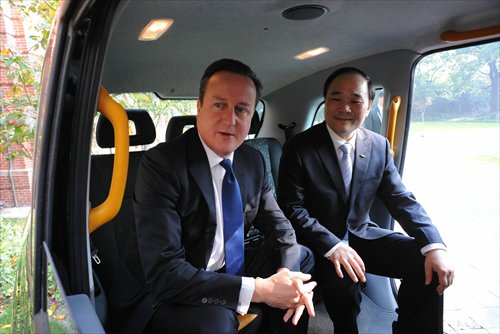HOME >> CHINA
Cameron signs large contracts
By Yang He and Ling Yuhuan Source:Global Times Published: 2013-12-4 1:08:01

British Prime Minister David Cameron sits in a London-style black cab with Geely Chairman Li Shufu. Li intends to operate London-style taxis in Shanghai. Photo: CFP
British Prime Minister David Cameron met with Chinese entrepreneurs and signed a large contract with Chinese hospitals and healthcare companies on the second day of his China trip on Tuesday.
Cameron signed contracts with Jack Ma Yun, CEO of Alibaba Group, the British Embassy in China said on its official Sina Weibo account on Tuesday.
Many British companies are planning to sell commodities ranging from British tea to non-mainstream fashion products on tmall.com, a Chinese online retail website owned by Ma, said the embassy.
Cameron also signed contracts with Chinese hospitals and healthcare companies, worth more than 120 million pounds ($197 million), according to the embassy's website.
At a luncheon party with businessmen from both countries, Cameron said that the UK supports free trade talks between China and European Union and revealed that in a few months, business travelers from Shanghai to the UK will get their visa within one day.
Also on Tuesday, Cameron met with Li Shufu, CEO of the Hangzhou-based Geely Holding Group, which has become a long-term investor of the British taxi industry since it acquired Manganese Bronze Holdings, a British taxi maker, in February 2013. The two held discussions over the future development of taxis in London, chinanews.com reported.
Cameron's China visit is a win-win trip for both countries not only economically but also in politics, Jin Canrong, vice director of the School of International Studies at the Renmin University of China, told the Global Times.
"The trip will not only bring great economic benefit to the UK, but also improve the country's influence in competition with other European countries like France and Germany," he said.
China, besides benefitting economically, can strike a balance in its relations with the three EU powers - Britain, France and Germany - by improving relations with the UK, which is also good for its relations with other Western countries, he noted.
"Signing the medical contracts is in accordance with mutual benefit of the two nations. Britain has the medical skills that are needed by China. At the same time, it is also beneficial for the British government to build its image domestically," Zhang Shengjun, international politics professor at Beijing Normal University, said.
Earlier, during Cameron's Monday talks with Chinese Premier Li Keqiang, the British prime minister voiced opposition against "Tibetan Independence."
Cameron said Britain respects China's sovereignty and territorial integrity, recognizes Tibet as part of China and does not support "Tibetan Independence."
"High-level exchanges between China and the UK had been at a standstill since Cameron met with the Dalai Lama despite China's objections in May 2012, which resulted in great economic loss for the UK," Jin said. "National interest has forced Cameron to soften his stance on Tibet."
Regarding the stance toward Tibet, according to Zhang, the attitude of Britain is not likely to change after Cameron returns to Britain.
Xinhua contributed to this story
Posted in: Diplomacy